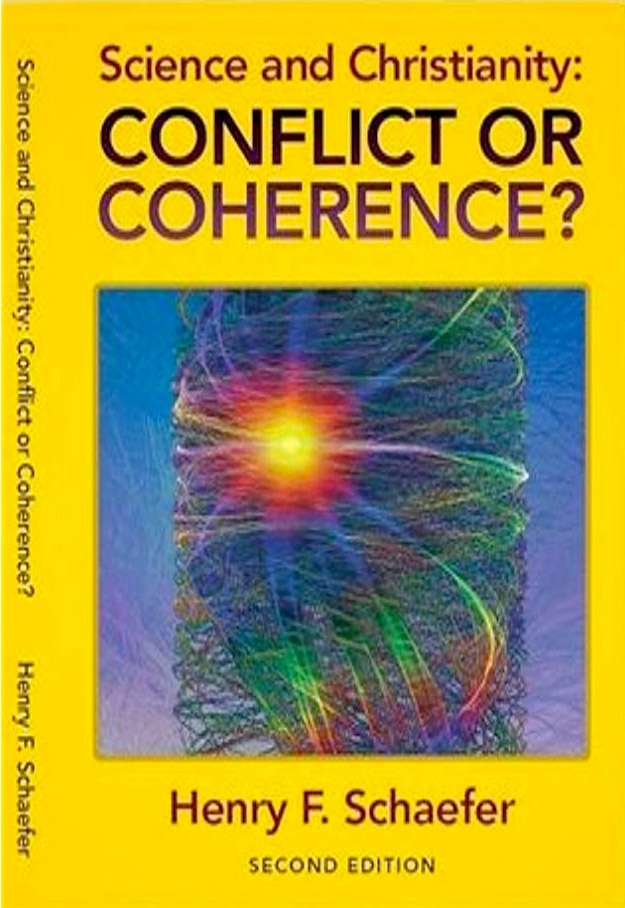
Henry F. Schaefer III was born in Grand Rapids, Michigan in 1944. He attended public schools in Syracuse (New York), Menlo Park (California), and Grand Rapids (Michigan), graduating from East Grand Rapids High School in 1962. He received his B.S. degree in chemical physics from the Massachusetts Institute of Technology (1966) and Ph.D. degree in chemical physics from Stanford University (1969). For 18 years (1969-1987) he served as a professor of chemistry at the University of California, Berkeley. During the 1979-1980 academic year he was also Wilfred T. Doherty Professor of Chemistry and inaugural Director of the Institute for Theoretical Chemistry at the University of Texas, Austin.
Since 1987 Dr. Schaefer has been Graham Perdue Professor of Chemistry and Director of the Center for Computational Chemistry at the University of Georgia. In 2004 he became Professor of Chemistry, Emeritus, at the University of California at Berkeley. His other academic appointments include Professeur d'Echange at the University of Paris (1977), Gastprofessur at the Eidgenossische Technische Hochshule (ETH), Zurich (1994, 1995, 1997, 2000, 2002, 2004, 2006), and David P. Craig Visiting Professor at the Australian National University (1999). He is the author of more than 1150 scientific publications, the majority appearing in the Journal of Chemical Physics or the Journal of the American Chemical Society.
In February 2004, a total of 300 scientists from 35 countries gathered in Gyeongju, Korea for a six-day conference. The conference was titled "Theory and Applications of Computational Chemistry: A Celebration of 1000 Papers of Professor Henry F. Schaefer III.
Critical to Professor Schaefer's scientific success has been a brilliant array of students and coworkers, including 50 undergraduate researchers who have published papers with him; 85 successful Ph.D. students; 41 Postdoctoral researchers; and 60 visiting professors who have spent substantial time in the Schaefer group. A number of his students have gone on to positions of distinction in industry (Accelrys, Allstate Insurance, American Cyanamid, AstraZeneca, AT&T, Avaya, Bicerano and Associates, Chemical Abstracts, Computational Geosciences, DeNovaMed, Deutsche Bank, Dow Chemical, Electronic Arts, Endress-Hauser, GAUSSIAN, Goodrich, Henkel, Hughes Aircraft, IBM, Komag, Lehman Brothers, Locus Pharmaceuticals, Mobil Research, Molecular Simulations, Monsanto, OpenEye, OSI Software, Pharmaceutical Research Associates, Polaroid, Proctor & Gamble, Q-CHEM, Reagens Deutschland, Ricoh, Schroedinger, SciCo, Sugen, and WaveSplitter Technologies).
Four of his graduated Ph.D.s have successfully started their own companies. Several have gone on to successful careers in government laboratories, including the Australian National University Supercomputer Center, Joint Institute for Laboratory Astrophysics (JILA), Lawrence Livermore National Laboratory, NASA Ames, National Cancer Institute, National Center for Disease Control, National Institutes of Health (Bethesda), Naval Research Laboratory, Oak Ridge National Laboratory, Pacific Northwest National Laboratory, Pittsburgh Supercomputing Center, and Sandia National Laboratories. Charles Blahous went directly from his Ph.D. studies with Dr. Schaefer to the position of American Physical Society Congressional Scientist Fellow, and eventually to positions of significant importance in the U.S. political system (chief of staff for Senator Alan Simpson of Wyoming and later Senator Judd Gregg of New Hampshire; and currently chief strategist for President George W. Bush's initiative to reform social security; see Wall Street Journal article April 22, 2005).
Many of Dr. Schaefer's students have accepted professorships in universities, including the University of Alabama at Birmingham, University of Arizona, Budapest University (Hungary), University of California at Merced, City University of New York, Fatih University (Istanbul, Turkey), Georgia Tech, University of Georgia, University of Giessen (Germany), University of Girona (Spain), University of Grenoble (France), University of Guelph (Ontario), University of Illinois-Chicago, University of Illinois-Urbana, Johns Hopkins University, Indiana University-Purdue University at Indianapolis, University of Kentucky, University of Manchester (England), University of Marburg (Germany), University of Massachusetts, University of Michigan, University of Mississippi, National Tsing Hua University (Taiwan), University of North Dakota, Ohio State University, Osaka University (Japan), University of Paris - Sud (France), Pohang Institute of Science and Technology (Korea), Portland State University, Pennsylvania State University, Rice University, Rikkyo University (Tokyo), Scripps Research Institute, Stanford University, University of Stirling (Scotland), University of Stockholm (Sweden), University of Tasmania (Australia), Technical University of Munich (Germany), Texas A&M University, the University of Texas at Arlington, University of Trondheim (Norway), and Virginia Tech.
Dr. Schaefer has been invited to present plenary lectures at more than 200 national or international scientific conferences. He has delivered endowed or named lectures or lecture series at more than 40 major universities, including the 1998 Kenneth S. Pitzer Memorial Lecture at Berkeley; the 2001 Israel Pollak Distinguished Lectures at the Technion - Israel Institute of Technology, Haifa; the 2007 C. V. Raman Memorial Lecture in Calcutta, India; and the 2007 Per-Olov Lowdin Lecture at the University of Uppsala, Sweden. He is the recipient of fourteen honorary degrees. He was the longest serving Editor-in-Chief of the London-based journal Molecular Physics (1995-2005). He was also the longest serving President of the World Association of Theoretical and Computational Chemists, from 1996 to 2005.
His service to the chemical community includes the chairmanship of the American Chemical Society's Subdivision of Theoretical Chemistry (1982) and Division of Physical Chemistry (1992). At the 228th National Meeting of the American Chemical Society (Philadelphia, August, 2004) the Division of Computers in Chemistry and the Division of Physical Chemistry co-sponsored a four-day symposium in honor of Dr. Schaefer.
Professor Schaefer's major awards include the American Chemical Society Award in Pure Chemistry (1979, "for the development of computational quantum chemistry into a reliable quantitative field of chemistry and for prolific exemplary calculations of broad chemical interest"); the American Chemical Society Leo Hendrik Baekeland Award (1983, "for his contributions to computational quantum chemistry and for outstanding applications of this technique to a wide range of chemical problems"); the Schrödinger Medal (1990); the Centenary Medal of the Royal Society of Chemistry (London, 1992, as "the first theoretical chemist successfully to challenge the accepted conclusions of a distinguished experimental group for a polyatomic molecule, namely methylene"); and the American Chemical Society Award in Theoretical Chemistry (2003, "for his development of novel and powerful computational methods of electronic structure theory, and their innovative use to solve a host of important chemical problems").
In 2003 he also received the annual American Chemical Society Ira Remsen Award, named after the first chemistry research professor in North America. The Remsen Award citation reads "For work that resulted in more than one hundred distinct, critical theoretical predictions that were subsequently confirmed by experiment and for work that provided a watershed in the field of quantum chemistry, not by reproducing experiment, but using state-of-the-art theory to make new chemical discoveries and, when necessary, to challenge experiment." The Journal of Physical Chemistry published a special issue in honor of Dr. Schaefer on April 15, 2004. He was elected a Fellow of the American Academy of Arts and Sciences in 2004. He was named the recipient of the prestigious Joseph O. Hirschfelder Prize of the University of Wisconsin for the academic year 2005-2006. He became a Fellow of the Royal Society of Chemistry (London) in 2005.
During the comprehensive period 1981 - 1997 Professor Schaefer was the sixth most highly cited chemist in the world out of a total of 628,000 chemists whose research was cited. The Science Citation Index reports that by December 31, 2006 his research had been cited more than 39,000 times. His research involves the use of state-of-the-art computational hardware and theoretical methods to solve important problems in molecular quantum mechanics.
Schaefer is also known as a student of the relationship between science and religion. One or more of the lectures in his popular lecture series on this important topic have been presented at most major universities in North America, including Harvard, Stanford, Berkeley, M.I.T., Yale, Princeton, and the Universities of Alberta and Toronto. Dr. Schaefer has also presented these lectures in many universities abroad, including those in Ankara, Bangalore, Beijing, Berlin, Bern, Bratislava, Brisbane, Budapest, Canberra, Cape Town, Chengdu, Chennai (Madras), Christchurch, Cluj-Napoca, Delhi, Durban, Goa, Hong Kong, Hyderabad, Istanbul, Kanpur, Kolkata (Calcutta), Krakow, Kunming, Lanzhou, Lausanne, London, Lucknow, Mumbai (Bombay), Paris, Prague, Sarajevo, Seoul, Shanghai, Singapore, Sofia, Split, St. Petersburg, Sydney, Szeged, Taipei, Tokyo, Urumqi, Warsaw, Xiamen, Zagreb, and Zurich. His continuously evolving lecture "The Big Bang, Stephen Hawking, and God" appears in many locations and in several languages on the worldwide web. This lecture has been one of the most popular articles about science on the web in recent years, as discussed in Michael White and John Gribbin's best selling biography of Professor Hawking (pages 314-315 of the 2002 edition).
On April 24, 2002 Dr. Schaefer received the Erick Bogseth Nilson Award, given to an outstanding university professor in North America, by the organization Christian Leadership. In May 2005 Dr. Schaefer was elected a Corresponding Member of the Catholic Academy of Sciences in the USA. A brief spiritual biography (through 1991, written by Dr. David Fisher) of Professor Schaefer may be found on pages 323 - 326 of the book More Than Conquerors, edited by John Woodbridge (Moody Press, Chicago, 1992). At the University of Georgia Professor Schaefer teaches a popular two-credit freshman seminar each year entitled Science and Christianity: Conflict or Coherence? Dr. Schaefer's book with the same title had its third printing in March 2004 and reached position #84 the same month on the best-selling list of Amazon.com. The fourth printing (with additions) appeared in March 2006.
Archives

